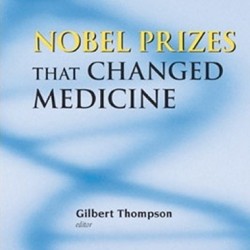By Helen Figueira
March 1, 2012
Time to read: 3 minutes
 New book celebrates key Nobel Prize-winning discoveries
New book celebrates key Nobel Prize-winning discoveries
No great scientific discovery is straightforward. Nobel Prizes That Changed Medicine delves into the science and stories behind the 15 Nobel Prize-winning discoveries that have had the greatest impact on medical science. Several CSC scientists have contributed to the book, edited by former CSC research leader Professor Gilbert Thompson, relaying their reflections on these stories of discovery from an engaging, personal perspective.
Anne Soutar (Lipoprotein) contributes a chapter on “The invention of the polymerase chain reaction and use of site-directed mutagenesis.” We see how the starkly different characters of Michael Smith and Kary Mullis, winners of the 1993 Nobel Prize in Chemistry, “fundamentally changed the means available to investigate how genes function… [providing] the basis [for] the explosion of knowledge about the human genome in health and disease during the last decade”
Timothy Aitman (Physiological Genomics and Medicine) co-authors a contribution detailing the tale of Andrew Fire and Craig Mello’s 2006 Nobel Prize in Physiology or Medicine. Awarded just eight years after the original publication of their findings, the prize celebrates the discovery of RNA interference (RNAi) – gene silencing by double-stranded RNA. “Their description of RNAi has transformed our understanding of the mechanisms that underlie gene regulation in cells, as well as making RNAi an essential tool in biological research,”
This book gives a fascinating insight into the journeys of scientific discovery that led to the some of the most important medical advances since 1901. Below, editor Gilbert Thompson explains his motivation for putting the book together.
AL
New book celebrates key Nobel Prize-winning discoveries
No great scientific discovery is straightforward. Nobel Prizes That Changed Medicine delves into the science and stories behind the 15 Nobel Prize-winning discoveries that have had the greatest impact on medical science. Several CSC scientists have contributed to the book, edited by former CSC research leader Professor Gilbert Thompson, relaying their reflections on these stories of discovery from an engaging, personal perspective.
Anne Soutar (Lipoprotein) contributes a chapter on “The invention of the polymerase chain reaction and use of site-directed mutagenesis.” We see how the starkly different characters of Michael Smith and Kary Mullis, winners of the 1993 Nobel Prize in Chemistry, “fundamentally changed the means available to investigate how genes function… [providing] the basis [for] the explosion of knowledge about the human genome in health and disease during the last decade”
Timothy Aitman (Physiological Genomics and Medicine) co-authors a contribution detailing the tale of Andrew Fire and Craig Mello’s 2006 Nobel Prize in Physiology or Medicine. Awarded just eight years after the original publication of their findings, the prize celebrates the discovery of RNA interference (RNAi) – gene silencing by double-stranded RNA. “Their description of RNAi has transformed our understanding of the mechanisms that underlie gene regulation in cells, as well as making RNAi an essential tool in biological research,”
This book gives a fascinating insight into the journeys of scientific discovery that led to the some of the most important medical advances since 1901. Below, editor Gilbert Thompson explains his motivation for putting the book together.
AL